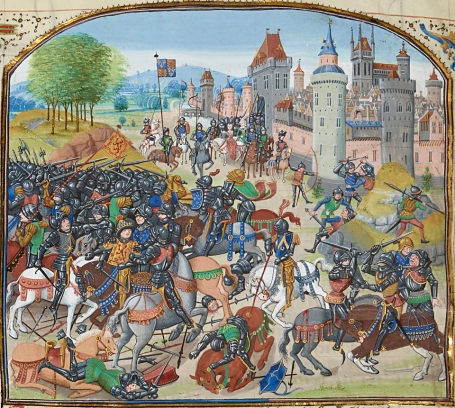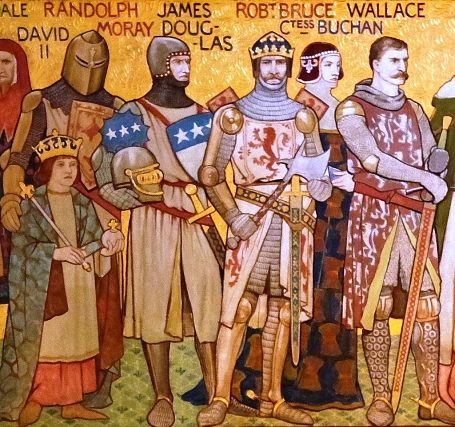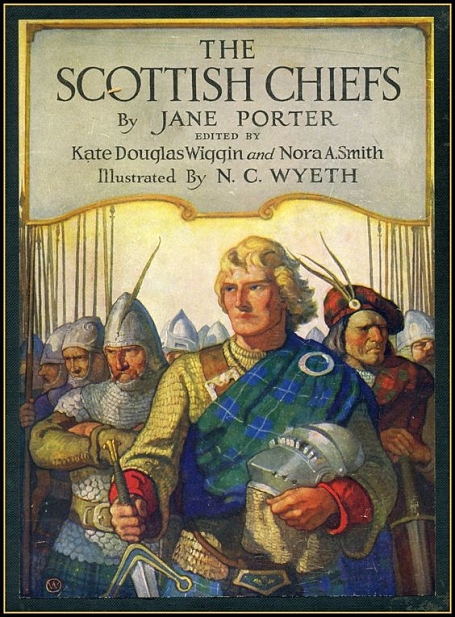The Life and Heroick Actions of the Renoun'd Sir William Wallace,
General and Governour of Scotland
by William Hamilton of Gilbertfield
Book VII, Chapter I
How WALLACE burn't the Barns of Ayr, put Bishop Beik out of Glasgow, and killed Lord Peircy
With Wallace now concluded is the Truce,
But mark what Treachery it does produce:
To English Faith, the great Seal they append
In February; yet March doth scarcely end,
When they of new contrive a hellish Plot,
Do break their Faith, and murder many a Scot.
The English King takes Journey in April,
And holds a mighty Council in Carlisle.
To which the English Captains hast'ned fast,
And privy were to every Thing that past.
None other to be present thought he good,
But such as were of true born English Blood.
Except Sir Aymer Vallance, as I'm told,
Who to the Scots a Traitor was of old.
The South'ron here Consult him, how and where,
They might cut off the Barrons bold of Ayr.
Who, when he had in Pluto's Myst'rie div'd,
Gave such Advice as Hell and he contriv'd.
"Four Barns," he said "built by the King's Command,
At the Head Burgh of that old County stand.
Where, at one Time, none but a single Man
May enter in, or see another can.
That is" said he, Pox on his Bloody Face,
"I think the only, and the proper Place,
To call the Barrons to a Justice aire
And then dispatch them at your Pleasure there."
To which they all, with Spite and Malice fill'd,
Consent, and vote them basely to be kill'd,
Except Lord Piercy, who, the curs'd Design,
And Villany, pretended to decline.
"The Scots," said he, "have keeped Faith so long
With me, I'll not be Witness to such Wrong.
But at the Time apointed will withdraw,
To Glasgow Town, from such a Bloody Law."
Fy on the Piercy that was so unkind,
Not to reveal the barbarous Design.
Where were thy Bowels of Compassion then?
That might have sav'd four or five Thousand Men
Of Scots and English, that no Harm did fear,
As by the tragic Story shall appear.
A cruel Justice then, they choos'd and fierce,
Whose bloody Acts a Heart of Stone would pierce:
Lord Arnulf, whom, Beelzebub scarce could match,
He undertook the Barons to dispatch.
Another Aire in Glasgow order'd they,
For Clydesdale Men upon the self same Day.
Thus they like Devils sit in humane Shape,
And charge that Wallace by no Means escape.
For well they knew, if he were overthrown,
They might possess all Scotland as their own.
Thus they conclude, to other give the Hand,
And set their Seals to this black hellish Band;
To Ayr the Justice speedily comes down,
And Piercy marches off for Glasgow Town.
The Justice aire on June the Eighteen Day
Was set, proclaim'd, no Barron was away.
The Scots they wondr'd, in a peaceful Land
Why English-men should rule with such high Hand.
Sir Rannald did appoint before this aire,
At Monkton-Kirk his Friends to meet him there.
Wallace was present 'mongst those Gentlemen,
He Warden was of Scotland chosen then.
Good Mr. John, who sirnamed was Blair,
Discharg'd his Friends from going to that Aire,
And did suspect since Piercy left that Land,
He was no Friend to Scots, did then Command.
Wallace from them went to the Church with speed,
There said a PATER-NOSTER, and a CREED.
He lean'd him down upon a Place hard by,
Then in a deep Sleep fell immediately:
Into that Slumber Wallace thought he saw,
A Stalwart Man that towards him did draw.
Who hastily did catch him by the Hand,
"I am," he said "sent to thee by Command."
A Sword he gave him of the finest Steel,
"This Sword," said he, "Son, may thou manage well."
A Topas fine the Plummet he did guess,
The Hilt and all, did glitter o'er like Glass.
"Dear Son," he said, "we tarry here too long,
Shortly thou must revenge thy Countrie's Wrongs."
Then led he him unto a Mountain high,
Where he at once might all the World see.
There left he Wallace, contrair his Desire,
To whom appear'd, a very dreadfull Fire,
Which fiercely burnt, and wasted thro' the Land,
Scotland all o'er, from Ross to Sulway Sand.
Quickly to him descended there a Queen,
All shining Bright, and with majestick Mein,
Her Countenance did dazle so his Sight,
It quite extinguish't all the Fire Light.
Of Red, and Green, gave him with modest Grace
A Wand, and with a Sapphire cross'd his Face.
"Welcome," she said, "I choose thee for my Love,
Thou granted art by the great God above,
To help and aid poor People that get Wrong,
But with thee now I must not tarry long;
To thine own Host thou shalt return again,
Thy dearest Kin in Torment are and Pain.
This Kingdom thou redeem it surely shall,
Tho' thy Reward on Earth shall be but small.
Go on and prosper, sure thou shalt not miss,
For thy Reward the Heavens eternal Bless."
With her right Hand she reached him a Book,
Then hastily her Leave of him she took.
Unto the Clouds ascended out of sight,
Wallace the Book embrac'd with all his Might.
The Book was writ in three Parts and no less,
The first big Letters were, and all of Brass:
The second Gold, Silver the third most fine,
At which he greatly wondred in his Mind:
To read the Book he made great haste, but as
He did awake, behold a Dream it was.
Quickly he rose, and there a Man he found,
Who did his Dream, and Vision all expound.
"The stalwart Man, who gave thee that fine Sword
Was Fergus King of Scots, upon my Word.
The Mountain does prognosticate no less,
Than Knowledge how our Wrongs thou must redress.
The Fire hasty Tidings doth presage,
The like of which was not heard in our Age.
The bright and shining Queen, whom thou didst see,
Was Fortune, which portends great Good to thee.
The pretty Wand which she unto thee sent,
Betokens Pow'r, Command, and Chastisement.
The colour Red, if I right understand,
Means bloody Battles shortly in our Land:
The Green, great Courage to thee does portend,
And Trouble great, before the Wars shall end.
The Saphire Stone she blessed thee withall,
Is happy Chance, pray God it thee befall."
"The threefold Book, is this poor broken Land
Thou must redeem, by thy most valiant Hand.
The great big Letters which thou saw of Brass,
Prognostick Wars that shall this Land oppress.
Yet every Thing to its true Right again
Thou shalt restore; But thou must suffer Pain.
The Gold betokens Honour, Worthiness,
Victorious Arms, Manhood, and Nobleness.
The Silver shows clean Life, and Heavenly bless,
Which thou for thy Reward shalt never miss.
Then do not fear, or in the least despair,
He shall protect thee who of all takes care."
He thank'd him, then, committing all to God,
Home unto Crosbie with his Uncle rode.
Both blyth and glad, all Night they lodged there,
And on the Morn, made ready all for Ayr.
The ballad, The Life and Heroick Actions of the Renoun'd Sir William Wallace, General and Governour of Scotland, by William Hamilton of Gilbertfield, 1722, is in the public domain.

The Kingdom of England and the Kingdom of Scotland fought dozens of battles with each other. They fought typically over land, particularly Berwick-Upon-Tweed, and the Anglo-Scottish border frequently changed as a result. Read more at Wikipedia.

The First War of Scottish Independence was the initial chapter of engagements in a series of warring periods between English and Scottish forces lasting from the invasion by England in 1296 ... Read more at Wikipedia.

Digitized version of The Scottish Chiefs, by Jane Porter, a novelization published in 1921 by Charles Scribner's Sons, about William Wallace and the First Scottish War of Independence. Read online at archive.org.